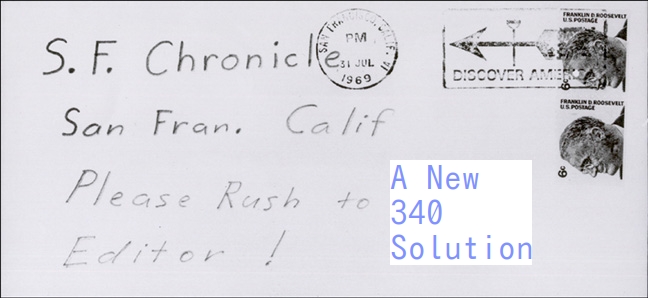

The recent documentary on The Hunt for the Zodiac Killer, which was shown on the History Network, teased that Kevin C. Knight, at the USC Natural Language Group, would be turning his profound knowledge and abilities toward solving the Zodiac Killer's 340 cipher. I was, needless to say, impressed; everyone knows about Knight's work on the Copiale Cipher.
I wasn't expecting very much from the History Channel's documentary; their reliance on specials about the SS and Hitler's Germany convinced me years ago that they were devoted to entertainment, not education. Their portrayal of CARMEL, the supercomputer which was going to tear into the 340, was silly, with blue lights behind the racks, scrolling Matrix-style text in which a dimly-outlined human face showed, and the like. The computer itself was of some interest, and so was the approach this very intelligent team was taking. Were they using a Beowulf cluster? A two-rack BlueGene/Q? How many pflops? Inquiring minds wanted to know -- and instead we got hysterically bad poetry. And some of the people you'd want on a 'dream-team,' particularly John C. King, Thang Dao , Pallavi Kanagalakatte Basavaraju , Dan Umanovskis , Taylor Berg-Kirkpatrick and Dan Klein , were nowhere to be found. Instead, we have people who an average audience will take to be geniuses -- young folk from Google wearing horn-rimmed glasses and the like. That, plus a poetry-writing 'supercomputer' of unknown provenance with dramatic lighting gives a clear picture of what is to happen at the end. The 'supercomputer' cranks ominously, and does nothing, and then Craig Bauer rushes in dramatically with another guesswork solution.
Thang Dao's master's thesis clearly outlines the problem with any sort of computational approach, and Pallavi Kanagalakatte Basavaraju's work highlights the problem.
To explain -- Dan Umanovskis' zkdecrypto can solve the 408 cipher in a matter of minutes. In fact, now that one can download zkdecrypto on virtually any platform, anybody, anywhere, can solve the 408. But the 340 remains insoluble, and people have used some very clever methods (as shown in the San Jose theses listed above) in their attempts. This tells us something important, I think: the problem is not in our methods; it is in the 340 cipher. Obviously, Kevin Knight is brilliant, and had some sort of very powerful computational technology at hand. He solved the Copiale, and so we know he is very good at this. What seems to be needed is a new approach, one that puts more emphasis on the pressures facing the awful person behind the cipher.
The Killer (I won't give him the honor of calling him by his preferred names, "Zodiac," or, as I hope to show, "Beltane Ally,"), had a great deal going on between August and November of 1969. A timeline will show what I mean.
It seems very unlikely, upon some reflection, to suggest that the 340 and 408 codes are fundamentally different. How would The Killer have, in the space of 99 days, (Thursday, July 31, 1969 to Friday, November 7, 1969) come up with some entirely new cipher? I think, instead that he realized two things:
I imagine, then, that The Killer (I'll use 'him, he' to describe The Killer) would use the same techniques of encryption that the Hardens uncovered. He would, however, use a far more complex vocabulary, more abbreviations, more misspellings, and more junk lines.
And no crib words. That, after all, is what anyone would do in the same situation. He saw that a crib made it possible to decrypt the 408; thus, he would avoid cribs at all cost.
And, as Ryan Garlick argues, there are several ways not to devise a solution to 340. Just as surely, there are several things a solution will require, as James Hodgkins pointed out in his addition to the knowledge brought forward by the Copiale Cipher; one must be familiar with the topic dealt with in the plaintext if the interpretation is to be sensible.
Further, as Garlick argues, the solution must follow rules, and be replicable by others from those rules. I should be able to tell you how I arrived at my solution, and without knowing the solution, you should be able to recreate the solution.
What are the things we know - or, at least, I contend we know? And what do they say about how we should proceed?
Lines 1-3 and 11-13 contain a distinct higher level of randomness than lines 4-6 and 14-16" of the 340. This appears to be intentional and indicates that lines 1-3 and 11-13 contain valid ciphertext whereas lines 4-6 and 14-16 may be fake.
The reasoning behind this solution
Exactly how this solution was derived
The solution itself, with explanatory material
Resources so you can
recreate this solution
improve on this solution
Absolutely the least interesting and important thing here